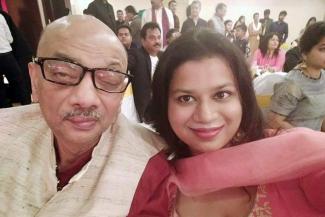
Sanjeev Agrawal, 60, a Professor of Mathematics has been battling invisible illnesses all his life. He reflects on how his responses to his daughter's challenges due to her invisible illnesses have been shaped by his experiences. #FathersDay series.
Asked to write something for Father’s day for PatientsEngage, I go to the site and start wondering – do I write as a caregiver or as a patient? Rather than work out a theme, I decide to write about whatever comes, at this time, to my mind. Hence – ‘Just Ramblings ….(byline – of a father)’. (Please take Websters’ definition of ramblings, rather than Oxford’s or Cambridge’s.)
“Papa, the pain is really bad this time” – what do I do? Just look for the painkillers.
I am, male, just turned 60, lecturer/teacher/professor of mathematics all my life, have been diagnosed with Myasthenia Gravis, Kearns-Sayre syndrome (KSS), Diabetes, have eyelids which do not open, have a daughter who struggles with Bipolar and Fibromyalgia, have her two cats, one wife, one son and several hundred students.
“Papa, should we consult a new neurologist? “ – Yes sure.
What else can we do? Keep on trying. Keep on meeting new doctors. When I was in college, the top doctor of AIIMS recommended an eyelid operation to remove the drooping in my right eye. Okay, top place, so got it done. (That eye is now almost useless as the vision is now completely blurred and the eyelids do not lift). Later – the best neurologists told me I had Myasthenia Gravis (MG), even had a major operation to remove a tumour, remained under treatment for MG for over 30 years … and then … new diagnosis – no MG but KSS, causes and treatment unknown. And most of them in Delhi do not even seem to want to consider Fibromyalgia.
Do they know what they are talking about? Yes – I believe that most doctors do the right thing – to the best of their knowledge. The knowledge/information base for most neurological and mental health problems is increasing daily, … , we can but hope that we end up with the right doctor at the right time.
I grew up as the middle child of a senior government official in small towns of west Uttar Pradesh. That meant that even though we were not rich, we were ‘privileged’. I studied in what was then, very often, the only English medium school in the town. Why is this relevant? Because nothing in my childhood, my environment, my upbringing, prepared me for the dual roles of a caregiver and of a patient of invisible/incurable illnesses.
“Will I ever be all right?”… Yes. You will be. We will not give up.
Doing well – top of my class from fifth grade in every school, dramatics, debates, playing cricket, hockey, badminton for my district – just did not quite understand why my legs pained all the time and my stamina did not improve. No diagnosis. Ended up as a student of ‘the college’ in Delhi. Finished college, went to Oxford on a scholarship, back to India to a top research institute and then to Delhi as a lecturer in my alma mater. Married and my daughter born and the son on the way. Nice life? Yes. Not much money, but our rides in the Mudrika, our train journeys, our vacations in small hotels, roadside food, … all were great.
“I am very sad today.”… Remember the good times. Take pleasure in the small things – that nice gourmet khichdi, the snowstorm in Ladakh, the dance of the peacock, the love of our cats, that hilarious TV series, your wonderful supportive friends, your movie, your poems, ….
“I am useless.” … No. You are not. Your attempts to inform people about invisible illnesses have helped many. It has helped me. I understand my students much better now. Your efforts have helped me to support, encourage, and motivate many students.
How did my daughter who had done well in the school boards, and entered a top law school, had a nice career in a city she loved, end up in this position? Was it the nearly fatal road accident in her final year or were these problems always there? Could I have done something? Can I understand her pain, her despair, her sadness, her loneliness? I can, maybe, but can at least try. Everywhere people tell me that mental health issues are like any other illness – cancer, diabetes,… To me that sounds as if we are saying cauliflower and bitter gourd are similar, both being vegetables. As a father I am not apologetic about my daughter … “Why is she behaving like that, she seems perfectly fine …, we never did such things…?”… your problem, you do not even attempt to understand the pains and the struggles of the younger generation.





